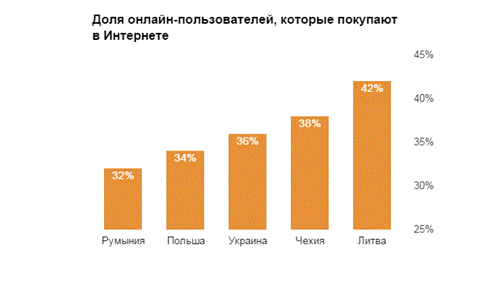Study: Buyers are looking for you - help them

The company TNS Infratest commissioned by Google conducted a study for an analytical online tool Consumer Barometer . This tool helps to better understand consumer behavior for planning and decision making in a changing digital environment.
Our agency is engaged in content marketing and in presentations, we often talk about the importance of expert publications on behalf of the company. This is due to the fact that users on the Internet do "rice" before buying a product. “To score” in the search box the name of the company, brand, product is a reflex of an increasing number of your potential customers. In the west, such "search engines" more than 60%. Therefore, we welcome all studies that confirm this fact.
According to the TNS Infratest report, when searching for information about local commercial establishments of Ukrainian consumers, first of all, they are interested in the price level (67%), opening hours (42%), availability of a specific product or service in a separate location (40%), exact address of the institution ( 33%), recommendations and reviews (32%), contact information (29%).
')
As a rule, “working hours” or, for example, “exact address” are searched for by people who have already decided to purchase a product or service in a particular store. This, shall we say, defined buyers, stuck for a short time in the narrow neck of the sales funnel. Is it possible to intercept them at this stage? It is theoretically possible if, as a result of a search for an address, they, for example, will see a contextual ad that will drive them crazy. But this is a theory. In practice, we work with the third of users who are looking for recommendations and feedback.
32% of Ukrainians are looking for information, perhaps, about your store, brand, product, service on the Internet. Naturally, if your competitor finds himself in the results area (website, forum, information portal about your topic) before you, and also offers an expert article, shows his concern for a potential client, a high level of understanding of his problems, will the person look for something something else? Hardly, because he already found everything.
67% study prices, and 40% look for the availability of a product or service. These are people who may have already found your site and are now exploring it. Ideally, if a person saw the right product and immediately bought it. But if it is difficult to find it - let's help! Make a review, write a blog post, analyze the advantages and disadvantages. Let your product be located not only through a search on the site, but through Google or Yandex. Let your website generate demand, not just satisfy it.
According to the study, you should pay attention to the video reviews. 34% of Internet users surveyed watch videos every day, 27% weekly, 12% monthly and only 10% less than once a month.
Content marketing is a tool that is able to “pick up” an audience. This is perhaps one of the most honest methods when a person does not need to be persuaded by “selling texts” and “nlp approaches”. You just share your knowledge, experience, expertise and leave the right to choose. You are chosen because you are an expert in what you sell. Read more about this in the article "Content marketing in the online store."
The most popular categories that Ukrainians are looking for information on the Internet before buying are: hotel information - in 92% of cases, Ukrainians will look for information about it online before booking a hotel; loans to individuals (92%), public transport of inter-city traffic (90%), air tickets (87%).


In 2015, the share of those who make purchases online in Ukraine reached 36%, which is on a par with other countries of Eastern and Central Europe.

In Poland, their share is 34% of all active Internet users, the Czech Republic - 38%, Lithuania - 42%, Romania - 32%.
Among other interesting data, it is worth noting the growth trend of Internet users in Ukraine and the general Internet mobileization. Thus, in 2015, an average of 1.1 Internet-connected devices accounted for one Ukrainian, an increase of 57% compared with 2013. In addition, the level of use of modern mobile devices continues to grow - 10% of people use a tablet, and 28% use a smartphone (for comparison: 7% and 24%, respectively, last year).
28% of smartphone owners use mobile search at least once a week. 22% are viewing online video, and 7% are looking directly for information about certain goods and services.
During the study, TNS Infratest surveyed more than 150,000 respondents in 56 countries around the world. In Ukraine, the study was conducted from January to March 2015, a sample of 1,000 respondents aged 16+ for the Connected Consumer Study (a study of the habits of the entire population, online and offline); and between November 2014 and February 2015, the sample size was 3,000 respondents aged 16+ for the Consumer Barometer Survey (a study on the behavior of Internet users).
Source: https://habr.com/ru/post/292506/
All Articles